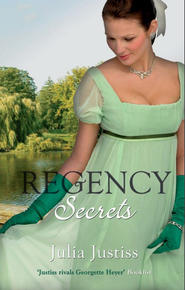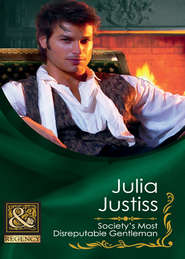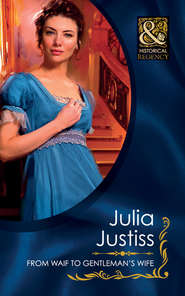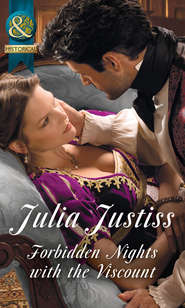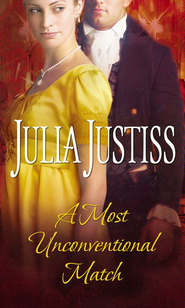По всем вопросам обращайтесь на: info@litportal.ru
(©) 2003-2025.
✖
A Scandalous Proposal
Настройки чтения
Размер шрифта
Высота строк
Поля
He rose and nodded. “Think nothing of it, Mrs. Spenser.” His shrewd eyes scanned her again, and she colored, sure he must have realized how staggering was the sum he’d quoted her, how impossibly far beyond her means.
“Don’t distress yourself, ma’am,” he said, his tone kind. “Lord Cheverley will pursue this to its conclusion, regardless of time or expense. I have had the privilege of his patronage for many years, and one could not find a more conscientious member of the nobility. You may trust him to do the right thing, Mrs. Spenser. And I doubt you will be troubled again.”
His attempted reassurance was nearly as daunting as his fee. She had known pursuing the miscreant would be costly, but had never dreamed the total would be that vast. How could she allow a virtual stranger, be he ever so noble, generous and dutiful, to absorb such an enormous expense on her behalf? But then, how could she ever reimburse him?
Emily sat in her tiny garden, absently eating the nuncheon Francesca had insisted on preparing for her when she returned. She was still pondering the dilemma, and no closer to a solution, when a shadow fell across her teacup.
Lord Cheverley himself stood over her. As her gaze met his, he gave her again that enticing, intimate smile. “Forgive me for disturbing you. I just wished to ascertain that the runner we sent was satisfactory.”
“Yes, of course. I hardly know how to thank you.”
“There’s no need.” He was looking at her intently, waiting, she realized, for her to offer her hand. When she raised it, he brought it to his lips, lingering over it a fraction longer than was proper.
“I would have called last night to report the guard was in place, but I had several appointments, and ’twas late when I returned to check. I saw no lights, and did not wish to disturb you.”
“You came by last night?” she echoed in astonishment.
“Of course. I told you I would. I could not have slept, had I not been assured of your safety.”
It had been so long since someone other than Francesca had expressed any concern whatsoever for her well-being that in spite of herself, she was touched. “You are too kind. Again, I thank you. And you must allow me to defray some of the costs—the runners, perhaps—”
He waved away the suggestion. “Certainly not. A business as clever and stylish as yours must surely succeed, but hardly needs any additional expenses at its inception. I am fully recompensed by knowing you are safe.”
Again, she felt absurdly touched. “I do feel safe. Thank you for that.”
His compelling gaze captured hers. “I would not beteem the winds of heaven/visit thy face too roughly,” he paraphrased from Hamlet. Gently he touched one finger to the bruised corner of her mouth.
A jolting spark tingled her lip. She stood mesmerized as he slowly removed his hand.
Bemused, she raised her own hand to the spot. ’Tis the bruise that throbs, she told herself.
“Ev, the runner wishes to speak with you.”
It seemed to take a moment for the newcomer’s voice to penetrate. With a grimace, Lord Cheverley stepped back. Waving at him from the garden door, Emily saw, was the man who had accompanied him to her shop the previous day.
His lordship turned on her another dazzling smile. “I shan’t keep you any longer, ma’am. The patrols will be properly maintained, so you may rest easy. If anything occurs to frighten or trouble you, send to me at once. Number 16, Portman Square. Someone there will know where to reach me if I’m from home.”
Once again he raised her hand to his lips. “I shall call again later.”
“’Twould be an honor, my lord,” she managed to murmur.
As Lord Cheverley strode from the garden, his companion ambled toward her. “Brent Blakesly, ma’am,” he said with a bow. “You can rest easy, you know. Evan is as good as his word. Trust him to guarantee your safety.”
“So I’ve been urged,” she murmured, recalling the solicitor’s advice. “I only wish he were not doing so at such great expense.”
She must have looked troubled, for Blakesly’s friendly face sobered. “You mustn’t distress yourself, ma’am. Evan is wealthy enough that his kindness places no strains upon his purse.” He gave her a deprecating smile. “I suppose, having always had vast sums at his disposal, he never realizes it might be difficult for his friends to easily accept his assistance.”
“But I am not a friend,” she replied, her voice low. “I have no more claim to his largesse than I have the means to repay it.”
“May I speak candidly, Mrs. Spenser?” At her nod, he continued, “Evan has a great dislike for bullies. ’Twas how I first met him, when as a runty lad at Eton he pummeled the two upperclassmen who were tormenting me. Seeing some villain attempting to take advantage of a lady, he would feel compelled to prevent it, even—” he grinned at her “—did he not so greatly admire the lady. But you must not imagine his doing so places you under any…obligation whatever. Indeed, I am certain he would be appalled should you even consider such a thing.”
Somehow, his certitude didn’t raise her spirits. She followed as he walked out to join Lord Cheverley on the street. No obligation whatsoever, Blakesly assured her. Trust him to do what is right, the solicitor advised.
But what is right? she wondered as, with a wave, the two men started down the street. And why did her dratted lip still tingle?
Hours later, Emily looked up from the tangle of bills on her desk. Dusk had fallen, and she could hear the lamplighters going about their tasks. Through the salesroom window she glimpsed the glow of a lighted cheroot. Another guard on duty, she surmised.
Sighing, she rubbed the tight muscles at the back of her neck and took another sip of her tea, long cold now. She had entered all the invoices into her ledgers, and though several customers had settled their accounts today and Lord Cheverley had brought his mama’s payment along with an advance on another order, the debit and credit columns still were nearly equal.
We are just barely surviving, she thought with a sigh. If she did attempt to repay Lord Cheverley, ’twould likely be his great-grandson who signed off the debt. Would he give her that long? Dear God, what was to become of them if he refused?
Immediate reimbursement in coin was impossible, the ledger clearly showed. A woman had but one other asset.
She recalled his heated glances, his lingering hand on her lip. She had seen lust in other men’s eyes, during and after her marriage. If she could bring herself to offer, would Cheverley accept that means of canceling her debt?
For an instant, she imagined those hands cherishing her bare skin, that lean mouth at her breast. A deep tremor sent heat rushing through her.
A flush of guilt succeeded it and she felt as if caught out in some unforgivable indiscretion.
Nonsense, ’twas ridiculous. She could not be unfaithful to a dead man.
Oh, but I didn’t want him to die, her heart cried back. How many times had she gone down on her knees on the rough stone of the village church, imploring God as Andrew’s life drained away breath by ragged, painful breath? Promising to go anywhere, do anything, if only God would spare him?
Well, her prayers had been for naught. At the end, her husband had died in that small dusty village. And if God had not heeded her desperate pleas then, He was hardly likely to concern Himself with Emily Spenser Waring-Black now.
No, if salvation came, she would have to arrange it herself. And while her shop teetered so precariously between success and failure, having, for a time, a rich protector to keep trouble away could only help.
The very idea of it ate at her soul like acid.
She gave a bitter laugh. For years while she scraped together the funds to return and open her shop, she’d managed to avoid the fate so often dealt beautiful but impoverished widows. How ironic that it threatened her now, back in the homeland she’d pined for and imagined a haven.
“Mistress, ’tis darkness you work in,” Francesca scolded as she entered. “And your tea, é frio! Another pot will I fetch, and light up the lamp. What’s to become of us, querida, if you lose those bright eyes?”
“What’s to become of us anyway?” Emily replied, more than a hint of despair in her tone. “And don’t make fresh tea—we can scarce afford what we drink now. I’ll make do with this.”
The maid sat herself on the desktop and, head tilted like a small brown bird, gazed down at her mistress. “Be of good heart, querida. Always, we have worries, but always, you prevail. We shall—how you English say it? Ah, yes, we shall come into.”
Emily had to smile. “Come about, I believe you mean. And I wish I had your optimism. Just now, I am having a difficult time imagining how we shall ever come about.”
“Yesterday, that porco threatens you, and today, poof—” the maid waved an expressive hand “—he is gone. Other worries, they too will go.”
“’Twill take more than a—” Emily stopped abruptly. “What know you of Mr. Harding?”
Francesca shrugged. “I hear things, yes? When I hear that voice, I come. I see what he does. Almost I am running to you, but then, the beautiful one arrives. And saves you.”
“Aye,” Emily said in a whisper. “But for what?”
The maid raised her eyebrows, as if the answer were all too plain. “He is a great lord, querida. He saves you for his honor.”






